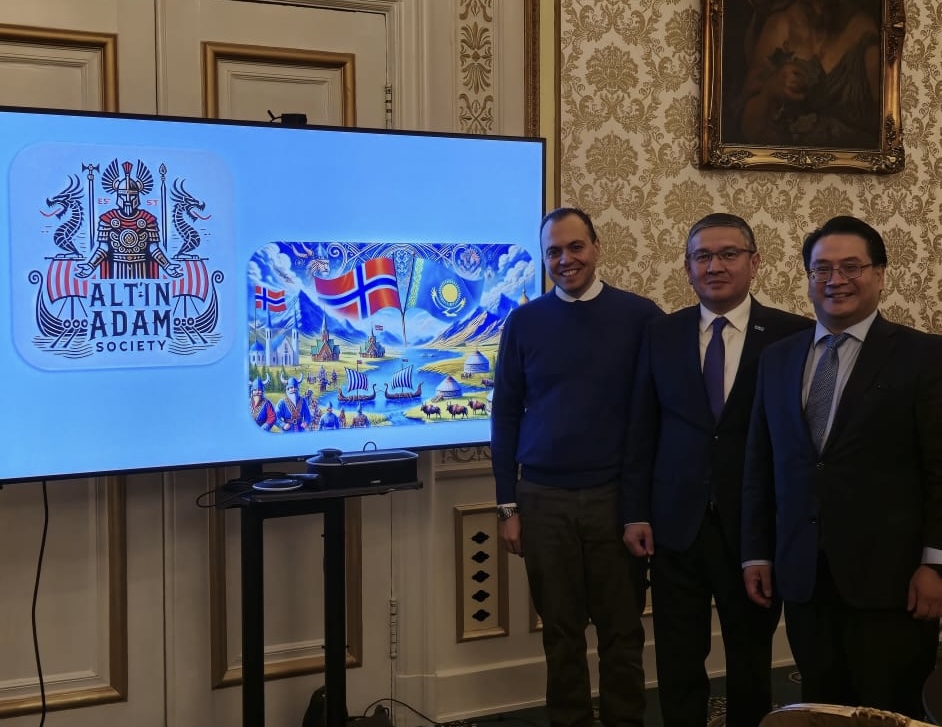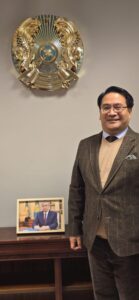ASTANA — Kazakhstan’s strategic position at the crossroads of East and West, balancing state control with a growing market economy, gives it a unique role in global affairs, said Glenn Agung Hole, an associate professor at the University of South-Eastern Norway, in an interview with The Astana Times.

Altin Adam Society in Norway, co-founded by Glenn Agung Hole (on the left). Photo credit: Glenn Agung Hole
“Kazakhstan fascinates me for many reasons. Over the years, I have watched the country make significant strides in innovation, education and infrastructure. Unlike many nations that simply copy models from the West, Kazakhstan seems to take a more strategic approach—learning from different experiences and tailoring them to fit its unique situation,” said Hole.
Hole is a distinguished Norwegian academic conferred as an honorary professor at Sarsen Amanzholov East Kazakhstan University on Nov. 28, 2024.
“Beyond observing its progress, I have had the privilege of engaging with Kazakhstan firsthand, serving as an international election observer and participating in the Astana International Forum in 2023. These experiences have made my connection to Kazakhstan much more than just an academic interest—it became a country I respect and am genuinely curious about,” he added.
Opportunities for Norway-Kazakhstan cooperation
Norway and Kazakhstan share commonalities as resource-rich nations but differ in their approaches to economic development. Despite their different financial strategies, Hole believes the two nations have an untapped potential for collaboration across various fields, including culture, tourism, academia and business.

Glenn Agung Hole. Photo credit: Glenn Agung Hole
“In Norway, there is often a certain skepticism towards the unknown, which is why I believe it is important to build relationships and stronger ties between Norway and Kazakhstan. That is also why I am one of the founders of the Altin Adam Society in Norway, which aims to strengthen cultural, academic and business exchanges between our nations,” said Hole.
He also highlighted the importance of Norway supporting Kazakhstan and its democratic development, describing the nation as a key player in a complex region. “The world needs a stable and democratic country in Central Asia, and I believe we have a responsibility to contribute to Kazakhstan’s democratic progress,” he said.
Norway’s expertise in sustainability could also provide valuable insights for Kazakhstan’s green initiatives. Hole stressed that Norway’s advancements in renewable energy, carbon capture and eco-friendly urban planning could aid Kazakhstan’s transition to a more sustainable economy.
“Kazakhstan, with its vast natural resources and strategic ambitions, has the potential to adopt some of these practices to meet its environmental goals. Norway’s expertise in hydropower, wind energy and carbon capture and storage (CCS) could be highly relevant as Kazakhstan seeks to transition towards a more sustainable energy mix,” he said.
“However, sustainability is not only about environmental factors. It also includes social sustainability, where I believe Kazakhstan has a great deal to teach Norway,” added Hole.
Despite its ethnic diversity, with more than 100 groups, Kazakhstan has maintained social harmony and stability for decades. Hole noted that its approach to fostering coexistence and national unity is a great model for Norway and other European nations facing the challenge of social division.
“Kazakhstan’s policies on ethnic inclusion, interfaith dialogue and nation-building offer valuable lessons on how to create a society that functions well across cultural and ethnic differences,” said Hole.
Education as a key to development
Kazakhstan has been prioritizing improvements in education, and Hole highlights several areas where Norway’s experience could be beneficial, particularly in training highly skilled professionals.
“Norwegian universities and vocational schools work closely with businesses to ensure that education is aligned with market needs. Apprenticeship programs, internships and research collaborations between students and companies help bridge the gap between theory and practice, ensuring that graduates are job-ready from day one,” said Hole.
Additionally, Norway’s advancements in digital learning and flexible education models, such as blended learning approaches, online courses and lifelong learning initiatives, could offer valuable lessons for Kazakhstan, particularly in reaching students in remote areas. At the same time, Hole sees potential for Norway to learn from Kazakhstan’s approach to promoting national identity and a multilingual education system.
“Kazakhstan has successfully integrated multilingual education policies by balancing Kazakh, Russian and English instruction, ensuring that students are well-equipped for both local and international opportunities. Norway, which faces challenges in balancing Norwegian, Sami and immigrant languages in education, could take inspiration from this model,” he said.
Hole also noted that some key areas of interest are entrepreneurship and innovation, given Norway’s experience in fostering start-ups and scale-ups, advanced support systems for entrepreneurs, and research collaborations in sustainable development and economic policy.
“Given Kazakhstan’s rapid growth and increasing focus on green technologies, there is significant potential to exchange best practices in sustainability, resource management and economic diversification. This could include comparative studies on energy transition policies, business regulations, and investment frameworks,” added Hole.
Additionally, he mentioned the possibility of establishing student and faculty exchange programs such as the Erasmus program and other mobility initiatives, as well as joint research projects and academic conferences on business development, digital transformation and leadership.
Kazakhstan’s growing role on the global stage
Hole emphasized Kazakhstan’s role as a key player in ensuring regional stability, especially given its geographic position between Russia and China. He noted that the country’s pragmatic foreign policy and economic modernization efforts position it as a bridge between global powers.
“As someone who has followed the country’s progress for years, I see Kazakhstan as a key player in ensuring stability in Central Asia, a region often overlooked but geopolitically significant,” said Hole.
“Unlike many other post-Soviet states that have struggled with governance and economic stagnation, Kazakhstan has achieved stability, sustained economic growth and pursued political reforms,” he added.
Kazakhstan’s energy resources, with its vast oil, gas, uranium and rare earth mineral reserves, also make it a vital partner for global markets, particularly as countries seek more secure and diversified energy supplies.
“I firmly believe that a strong, democratic and economically developed Kazakhstan is not just good for Central Asia—it is good for the entire world. A stable Kazakhstan ensures regional security, energy reliability and a strong counterbalance in global politics (…) Kazakhstan has an incredible opportunity ahead, and I look forward to seeing how it continues to shape its future on the world stage,” said Hole.
